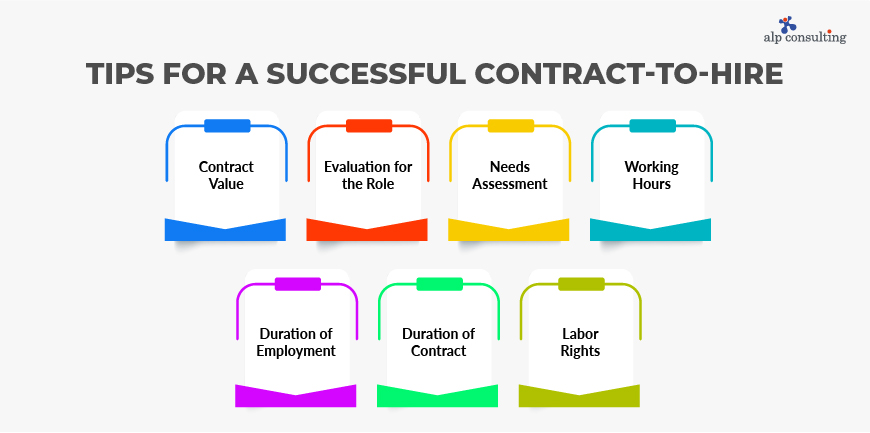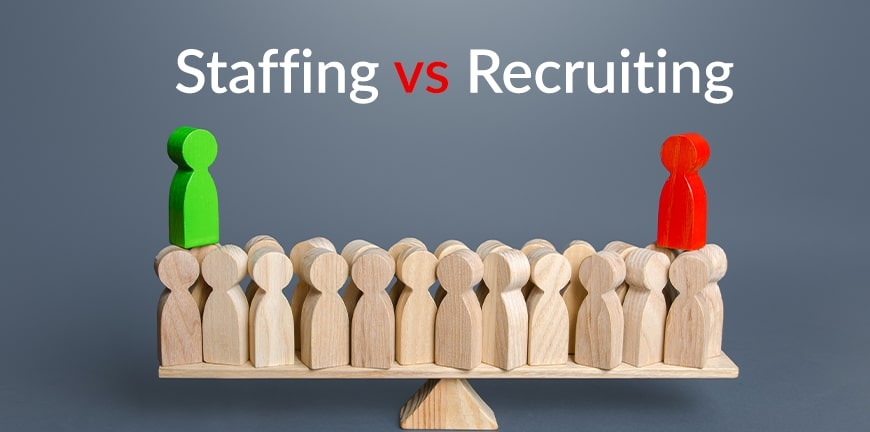
Direct Hire vs Contract to Hire: Which Is Better for Your Business?
14/12/2025
What is Virtual Staffing: Benefits and Tips
15/12/2025- What Is a Contract to Hire (C2H)?
- How Contract-to-Hire Works?
- Why do Companies use the Contract to Hire Process?
- What are the Differences Between Contract-to-Hire permanent vs Temporary Employment?
- Contract-to-Hire is Common in which Industries?
- What are the Pros of Contract to Hire?
- What are the Cons of Contract to Hire?
- Tips for a Successful Contract-to-Hire
- What is the Difference Between a Contract and a Contract to Hire?
- How to Hire a Contractor?
- What Are the Legal and Compliance Rules for Contract-to-Hire in India?
- What Is the Future of Contract-to-Hire Employment?
- Key Takeaways
- Frequently Asked Questions (FAQs)
As an owner of the Company, you have a perilous task on hand. You have to hire a senior business analyst to help forecast the needs of your company and ensure that all the items are in stock when they need to be throughout the year, especially to meet the demand surges during festivals. Not an easy task. You are confused when someone tells you that a contract to hire is a great option.
Being a close friend, whose suggestions you are open to considering, you pay heed to what he just said and are now exploring what a contract to hire really is and how it works!
What Is a Contract to Hire (C2H)?
C2H means Contract-to-hire and is a flexible hiring framework where professionals start on contract, with permanent employment offered later based on performance & organizational needs.
How Contract-to-Hire Works?
Here, the important thing to note is that in a contract to hire, there is an intent from both parties to move to a full-time role, and that both parties, the employer and the employee, accept the terms and conditions of a full-time role in the company as well. However, both the employer and the employee can terminate the contract on the completion of the contract period.
With advancements in AI and the need to hire candidates with advanced skills becoming a priority, and there being a skill gap in the current job market, contract staffing and contract-to-hire are slowly becoming very popular options.
Why do Companies use the Contract to Hire Process?
Several organizations prefer using a contract to hire as it provides them with flexibility and time to thoroughly evaluate and select professionals who cater to their business goals. Let us look at some of the key reasons:
1. Eliminated Recruitment Risk
Organizations, before making any concrete decision, can thoroughly assess an individual in a real work landscape and select accordingly, before hastily making commitments. This significantly diminishes the risk of bad hires.
2. Flexible Options
By adopting this approach, companies can adjust their manpower as per market trends, workloads, or unprecedented economic situations without the burden of committing to long-term recruitments.
3. Cost Effectiveness
Organizations can do away with certain additional expenses associated with permanent hires, as for contract workers, it is the staffing agencies that manage the payroll system. This results in a reduced initial cost for companies.
4. Expedited Hiring
Organizations partnering with staffing agencies for contract workers can get access to pre-assessed professionals, saving their time and resources and speeding up the recruitment process.
5. Access to Niche Talent
It is beneficial for businesses that require niche talent for specific tasks or projects. The contract-to-hire approach will not only bring to the table specialized talent but also enable companies to get into a long-term obligation of recruiting permanent staff.
What are the Differences Between Contract-to-Hire permanent vs Temporary Employment?
Criteria |
Contract-to-Hire Employment |
Permanent Employment |
Temporary Employment |
| Definition | Employee works on a fixed-term contract with the possibility of being hired full-time based on performance. | Employee is hired directly by the company on a full-time, long-term basis. | Employee is hired for a short duration or specific project without long-term commitment. |
| Employment Duration | Short-term initially, with an option to become permanent after evaluation. | Indefinite or long-term employment. | Strictly short-term (a few weeks to months). |
| Employer Relationship | Initially employed by the recruitment agency or on contract, may transition to company payroll later. | Directly employed and managed by the company. | Typically employed by a staffing agency or on a company contract for a limited period. |
| Job Security | Moderate — depends on performance and the company’s hiring decision. | High — stable employment and long-term growth opportunities. | Low — ends when the project or contract duration is completed. |
| Benefits (Health, PF, Bonus, etc.) | Limited during contract; full benefits only if converted to permanent. | Full benefits provided as per company policy. | Usually limited or not provided beyond statutory requirements. |
| Payroll Responsibility | Recruitment/staffing agency or employer during the contract phase. | Directly under the company payroll. | Typically under agency payroll. |
| Hiring Flexibility (for Employer) | High flexibility allows evaluation before permanent hire. | Less flexible; involves long-term commitment. | Very high flexibility for short-term staffing needs. |
| Cost to Employer | Moderate — includes contract and potential conversion costs. | High — includes full benefits and long-term commitments | Low to moderate — paid only for project duration or time worked. |
| Candidate Perspective | Opportunity to prove skills before getting a permanent offer. | Long-term career growth and job security. | Quick income source or short-term work exposure. |
| Best Suited For | Roles where employers want to test fit before a long-term hire. | Core positions that require long-term stability. | Seasonal, project-based, or temporary workload roles. |
Contract-to-Hire is Common in which Industries?
Let us find out which industries commonly use the Contract to Hire approach:
- IT
- Finance
- Telecommunications
- Retail
- E-commerce
- Healthcare
What are the Pros of Contract to Hire?
For employers
1. Flexibility
C2H can help you explore different candidates with varying skill levels and consider the work intent and flexibility offered by each.
2. Trial Run
Allows companies to save a lot of time and money by doing a trial run with the employee if he/she is a good fit for the company.
3. Savings in money
At least for the trial run, you are not providing any benefits that you normally give to your full-time employees, which saves you a lot of money.
4. Savings in Time
You can get an expert in very little time, and you have the course of a few months to decide whether they will cut.
5. Can seek the help of a staffing partner
A staffing partner can help you negotiate terms with the candidate so that you get the best value from the contract.
For contractors
1. Flexibility
C2H can help you explore different opportunities and employers while keeping the security of a job in the short term.
2. Trial run
C2H allows an employee to do a trial run with a company to see if the employee and the company are a good fit for each other.
3. Assess the company’s culture
C2H allows you to assess a company’s culture and make sure it suits your work style and life.
4. Showcase the value your work brings to a company
Contract-to-hire work allows you to showcase how you add value to the company, for instance, by doing business analysis or managing marketing leads.
5. Build your professional network
You can build a professional network very quickly, especially if you are hired by a big company.
What are the Cons of Contract to Hire?
For Employers
1. Need to find a trusted staffing partner
There are several staffing partners in every geography. Finding a reliable one can be a challenge.
2. Change in priorities
It is often when the contract period is over that the requirement is no longer there, at which point terminating the contract becomes difficult.
3. Lack of dedication from the contractor
If the new hire does not show the necessary commitment to the role, then it could lead to a lot of problems, including laziness and carelessness in your workplace, which might prove to be a costly mistake.
4. Legal problems
If either party breaks the contract, there could be legal problems. This, however, rarely happens for a contract-to-hire agreement.
For Contractors
1. Company culture could be a problem
If the company culture is not a right fit, then problems could exist, which may not be easily resolved.
2. Lower job security
The job is safe and secure for the contract period, but not beyond that. What if you are not confirmed as a full-time employee?
3. Change in priorities
If you find a better role, you will still need to excuse yourself and continue with the contract-to-hire role, which will waste that opportunity and a lot of time.
4. Legal problems
If either party breaks the contract, there could be legal problems. This rarely happens in a contract-to-hire agreement.
Tips for a Successful Contract-to-Hire
When you are looking to fill a contract-to-hire role, there are some considerations that you must make. These considerations will help you pick the right candidates, remove any ambiguity or doubts from the mind of the candidate, and consequently boost the business’s bottom line. Some of these considerations are:

1. Contract Value
The financial worth of the contract and how it will affect the business. A detailed financial analysis must be done.
2. Evaluation for the Role
How to evaluate the candidate for the role, and who will be involved in the evaluation?
3. Needs Assessment
Will the job need to change in the future, and will the hire need assistance with upskilling in the short term itself?
4. Working Hours
How will the contractor’s work hours be organized, and will they remain the same in the future also?
5. Duration of Employment
How long do you plan to work with the hire as a full-time employee, if they qualify for full-time employment?
6. Duration of Contract
How long do you plan on engaging the hire, and what methods will you use to assess if the candidate is suitable for full-time employment?
7. Labor rights
What salaries and benefits are you offering contractual hires? Can you offer additional benefits if the candidate asks for them?
What is the Difference Between a Contract and a Contract to Hire?
A contractual hire is temporary staff hired with the intent of service only for a specific period. There is no intent to convert the staff to full-time or offer them the benefits and rewards that a regular employee has. A contract-to-hire role, on the other hand, is made with the intention of hiring a contract worker as a regular employee after a period of a few months.
How to Hire a Contractor?
You can hire a contractor by yourself or with the assistance of a staffing agency. Opting for a staffing agency would be the best way to do it if you do not have any prior experience in contract-to-hire. A staffing agency would be aware of how to frame the contract, what channels to use to source candidates, and even have an idea of how long it would take to find a suitable hire.
What Are the Legal and Compliance Rules for Contract-to-Hire in India?
Here are a few vital legal compliance rules in a contract-to-hire process that Indian businesses need to follow diligently. Let us check them out:
- Labour Laws: The employer or staffing agency must comply with laws like the Contract Labour (Regulation and Abolition) Act, 1970.
- EPF & ESI: Provident Fund (PF) and Employee State Insurance (ESI) contributions are mandatory and usually managed by staffing agencies.
- Taxation: Income tax is deducted at source (TDS), and appropriate and accurate payslips and Form 16 must be provided.
What Is the Future of Contract-to-Hire Employment?
Here are a few emerging trends that shape the future of Contract to Hire employment:
Spike in Adoption- More organizations are realizing the contract-to-hire benefits and are adopting it to drive businesses smoothly and adjust to temporary tasks or project needs whenever necessary.
AI Integration- AI-backed tools will be used to help recruiters and organizations match ideal talent accurately to suitable job roles. As per reports, in India, 41% of HR/recruitment jobs may be automated by 2030, reflecting strong momentum.
Emphasis on Remote and Hybrid Work Modes- The utilization of modern technology is making it easier to hire people for flexible work modes. This helps employers to dive into a diverse and vast talent bank.
Venturing into New Markets- Businesses are focusing more on a contract-to-hire model to expand into job markets that exist in tier 2 and tier 3 cities.
In an era where business scopes and environments are changing at the blink of an eye, hiring requires flexibility and a resilient approach. One of the most reputable and trusted staffing agencies, Alp Consulting, offers a full-proof contract to hire solutions, assisting organizations to acquire appropriate talent. Analyse the right fit and make informed and sustainable decisions.
Our team of experts at Alp has an in-depth understanding of the ever-changing market trends and manpower needs, and trends, ensuring businesses receive precise hiring solutions for businesses across sectors.
With over two decades of experience in recruitment and staffing, Alp Consulting can help find the right contractor(s) for your needs, no matter the size of your company. We will also do it in the least time possible and with the guarantee that we will find the right person for the job. So, when are you talking to us?
Key Takeaways
- C2H has a trial phase before permanent hiring
- The approach reduces recruiting risks and offers flexibility
- Saves cost and time
- Benefits both the employer and the employee
- Future growth influenced by AI-driven tech and market trends
Frequently Asked Questions (FAQs)
1. What is a contract-to-hire position?
A contract to hire a role is to be filled permanently after a specific period. During this time, the candidate who is chosen for the position would be evaluated, and a decision would be made at the end of the contract period.
2. What does contract to hire mean?
Contract to hire means hiring a candidate temporarily, with a commitment to go on board as a regular employee after a specific period, as mentioned in the contract. A contractor is to abide by the rules mentioned in the contract, failing which there would be legal ramifications. The same goes for the employer, and if there is a staffing agency, then they do as well.
3. How does contract-to-hire work?
In a contract to hire, either the employer directly contracts the hire for a specific period with the promise of full-time employment, or a staffing agency takes over, acting as a mediator, and the hire is on the payroll of the staffing agency but works for the employer.
4. Are contract-to-hire jobs safe?
Contract-to-hire jobs are safe, at least for the duration of the contract. There is no job guarantee beyond that. The transfer of the candidate to a full-time role depends entirely on how capable the hire has been in the role.
5. Is a contract to hire a good idea?
Yes, contract-to-hire is a great idea, especially if you have a good staffing agency working for you and you are pressed for time and need to hire a good candidate soon. You can also always change your mind later if the candidate is not a good fit.
6. What is the typical duration of a contract-to-hire role?
The usual duration of a contract-to-hire role is 3 to 12 months; however, contracts of 3 to 6 months are also available for evaluation.
7. Is contract-to-hire suitable for freshers?
Contract to hire is suitable for freshers, providing them with exposure to attain real-world experience and showcase their skills.
8. Who is my employer during the contract-to-hire period?
The employers during your contract-to-hire period are essentially a staffing or third-party vendor.
Contact Us For Business Enquiry

Kasthuri R
Kasthuri R is the Co-Founder & Executive Director at ALP Consulting, bringing over 23 years of experience in search, staffing, and HR consulting. She has been instrumental in driving ALP’s recruitment, employee leasing, and executive search practices across diverse industry verticals. With deep expertise in talent acquisition, HR strategy, and operational management, Kasthuri has built scalable, client-focused solutions that enhance workforce efficiency. Her strategic leadership continues to steer ALP Consulting toward innovation and excellence in people management.





